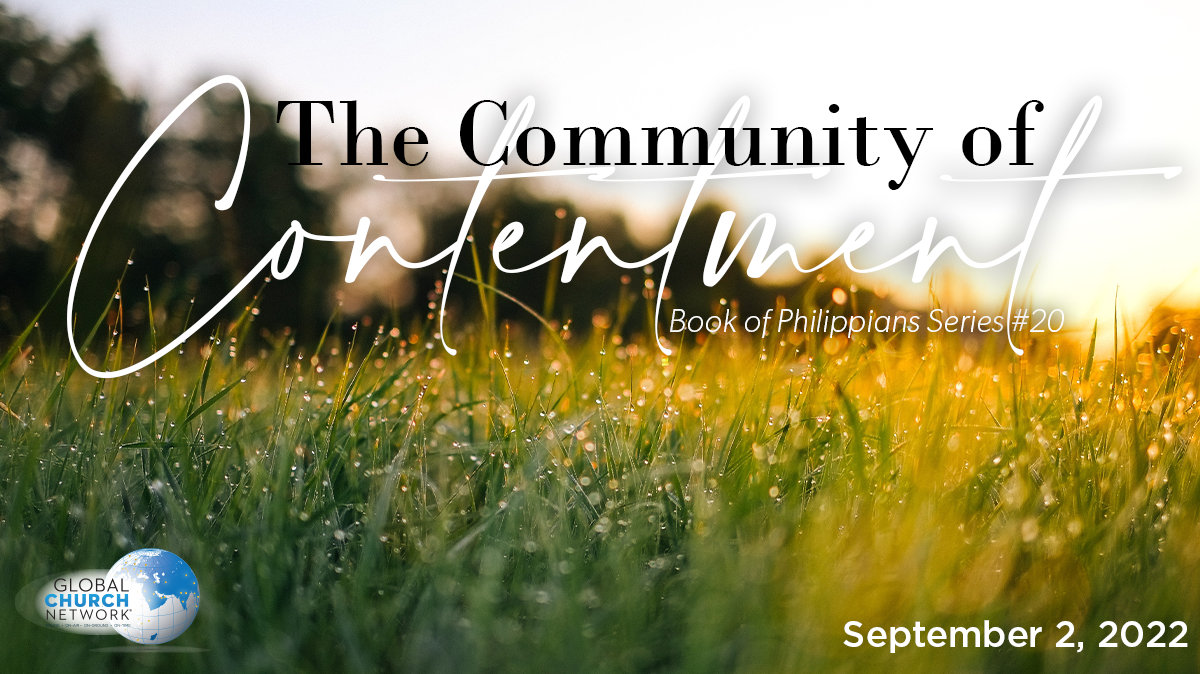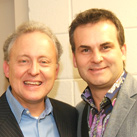How To Heal A Church Fight: Philippian Series #20

Are you a contented person? If you have contentment, you have a great treasure. It has been said that contentment softens our privations, sweetens our provisions, and makes a cottage as fair as a castle. People are looking for contentment. They have a restlessness, an uneasiness, and a dissatisfaction in their life.
 I once heard about a Quaker who wanted to teach a lesson to his neighbors. He said that he was going to give a lot of land to the most contented person in the village. One day a guy came and knocked on his door to collect the lot. The Quaker said to him, “Art thee a contented person?” The man said, “Yes, I am.” The Quaker said, “If thou art contented, then why dost thee want my lot?”
I once heard about a Quaker who wanted to teach a lesson to his neighbors. He said that he was going to give a lot of land to the most contented person in the village. One day a guy came and knocked on his door to collect the lot. The Quaker said to him, “Art thee a contented person?” The man said, “Yes, I am.” The Quaker said, “If thou art contented, then why dost thee want my lot?”
Are you contented? Are you really satisfied in life? I believe most people are not contented. Instead of being filled with contentment, they are filled with complaint. We complain about many things and are seemingly striving for more.
We complain if the children are noisy, rather than being grateful that they are healthy and happy. We lament our work when there are many people who are too sick to work. We are discontent because our car is not the way we would like for it to be or our house is not the way it should be, and yet there are many people in the world who have never seen or driven a car, and they have never had a house.
Paul writes in Philippians 4:10-13:
But I rejoiced in the Lord greatly, that now at last you have revived your concern for me; indeed, you were concerned before, but you lacked an opportunity to act. Not that I speak from need, for I have learned to be content in whatever circumstances I am. I know how to get along with little, and I also know how to live in prosperity; in any and every circumstance I have learned the secret of being filled and going hungry, both of having abundance and suffering need. I can do all things through Him who strengthens me.
In this chapter, I am writing about contentment from the words of a man who had found the secret of contentment himself. Apostle Paul writes in Philippines 4:11, “I have learned, in whatever circumstance I am, in this to be content.”
Now, follow me carefully. In verse 12, he says, “I know.” The word “know” means to come to know something by experience. Paul is saying, “I have had the experience of contentment. I have learned what it means to be contented.”
Then, he says, “I have learned.” The word “learn” is one that Paul took right out of the mystery religions of his day. It was a word that meant “to be initiated.” In other words, “I have been initiated. “In those days people would be initiated into the mystery religions. They were told that as members of the mystery religions that they would possess insight and secret information into deep divine truths and can know these truths. Paul borrows that word, and he says, “I have been initiated and I am in a member of the community of the contented.”
Are you a member of the community of the contented? I am going to share with you the qualifications to enter a level of life that most never discover.
I. We Should Rejoice in Our Provisions
 The first secret we learn from the words of the Apostle Paul is that if you want to be in the secret society of the contented, you have to learn to rejoice in your substance. Rejoice in what you have. Paul says in Philippines 4:10, “But I rejoiced in the Lord greatly.” He is rejoicing in his provisions.
The first secret we learn from the words of the Apostle Paul is that if you want to be in the secret society of the contented, you have to learn to rejoice in your substance. Rejoice in what you have. Paul says in Philippines 4:10, “But I rejoiced in the Lord greatly.” He is rejoicing in his provisions.
We have to keep in mind that God was meeting the needs of Paul in a special way. In fact, the whole background of the book of Philippians is based on the fact that the believers in Philippi had been sending special gifts to Paul. They had shared in his ministry because of the gifts they had sent.
It seems that it had probably been about 10 years since they had sent a gift to him. It was not that they did not love him. It was not that they did not care for him or that they were unconcerned about him. Paul says in verse 10, “you have revived your concern for me.” The word, “revived” is a beautiful word. It is a word that was used to describe beautiful flowers blossoming again in the springtime. “Your care, your interest, your fellowship in the gospel with me has been like a beautiful flower blossoming again in the springtime.
God knows our needs. God can meet those needs. Paul had needs. He talks about his substance here. He says in verse 12, “I know how to get along with little, and I also know how to live in prosperity.” He knew what it was to have a lot and he knew what it was like to have a little. But regardless of what those circumstances may have been about his provisions, Paul was a man who had needs just like everybody does.
Sometimes, we idealize people in the Bible and forget that they were real life human beings. Paul actually lived and was a real human being. He snored, and he sneezed, and he scratched just like people do today. He had to eat just like we have to eat. He had to wear clothes just like you and I have to wear clothes. God knows we have needs.
God knows that you need food. God knows that you have bills to pay. The Lord Jesus said in Matthew 6 verse 32, “For your heavenly Father knows that you have need of all these things.”
Paul realized that God knew he had needs. I want you to also notice in these verses that God sometimes meets our needs in unusual ways. God could meet our needs directly out of heaven. But you will notice here that God uses the faithfulness and the generosity of the Philippian believers to meet the need in Paul’s life. He said, “you have revived your concern for me.”
He’s saying, “You were caring, but you lacked opportunity.” He was saying that you didn’t have the opportunity, but God has given you the opportunity again.
We should take the opportunities that God gives us. In Galatians 6:10, we read, “As we have, therefore, opportunity, let us do good unto all men, especially unto them who are of the household of faith.” He’s saying that when God gives us an opportunity to do good, then take that opportunity. When God makes an opportunity for you to be a blessing in the life of some individual, then God says to take advantage of that opportunity.
God can meet the needs directly out of heaven. God did that for Elijah. God fed Elijah from ravens right out of heaven. If God wanted to, He could send the ravens to provide you with your food and with your needs. God could set up a conveyor belt right out of heaven.
But God uses other people to meet needs in the lives of people. Not that God has to have them to get the provision to the people, but that God desires for us to get the blessing of having a part in sharing with someone else in helping with their needs. If God has laid it upon your heart to do something, do it for God. If God provides you an opportunity, take advantage of it.
Here’s the point of this whole thing when it comes to contentment. Paul is basically saying here, “I have learned to rejoice in whatever God provides in my life.” Rejoice in your provisions whatever they may be. You may have a lot or a little. Rejoice in whatever it may be. How much do you have to have to be satisfied? What does it take to satisfy you?
How many gadgets do you need? This is the day of gadgets. Do you have gadgets? I own all kinds of gadgets. Sometimes I think about just laying them all aside. Do you ever get tired of all the gadgets? You can hardly have any privacy anymore. The phone is ringing or e-mails or coming in. How many gadgets do we have to have to be satisfied?
What kind of car do you have to have in order to be happy? What size house do you have to own in order to be satisfied in your life? If you want to learn the steps into the community of the contented, you need to learn whatever God has provided you thank Him for it, praise Him for it, and serve Him in the midst of it.
Did you have breakfast this morning? If so, God provided you food this morning. You had something to eat. You had some clothes you could put on. Chances are you have an automobile to drive. If you want to be a member of the community of the contented, then rejoice in your provisions.
Shortly before Mother Theresa’s death she said, “You will never know that Jesus is all you need, until all you have Jesus.” When she passed onto heaven, all she owned was a bucket, stick, and a pair of worn-out sandals. Do you own more than a bucket, a stick, and a pair of worn-out sandals? She can come to learn that Jesus was all she needed in this life. It is not Jesus and something else; it is Jesus. Jesus gives more than satisfaction; He gives contentment.
II. We Should Rest in Our Possessions
 We need to rest in whatever condition you are in or rest in your situation.
We need to rest in whatever condition you are in or rest in your situation.
You have to keep in mind where Paul is as he writes these words. Paul is incarcerated in a Roman prison. Yet, when you read this letter of Paul’s, the book of Philippians, you will find a man who is contented in his situation. He is not fussing or fretting. There is not sense of frenzy or unease in his life whatsoever.
Paul is in prison and writes, in Philippians 4:11, “I have learned, in whatever circumstance I am, in this to be content.” I want to focus on this word content for a moment. What does it mean to be contented?
Self-Satisfaction
Let me just first of all say that it is not self-satisfaction. There are some people who think that to be contented means you are totally satisfied and have no ambition whatsoever. I believe the Bible teaches that there is a place for a sanctified ambition, that there is a place for a desire to be everything that you can possibly be.
I do not think it is right for people to be contented making “C’s” when they can make “A’s.” I do not think it is right for people to be content to be the office clerk in the business when they can be the president of the business. You should not be contented to be third string when you can be an All-American. I don’t think any of us should be contented to be a mediocre Christian when we could be on fire for Jesus Christ and shake the world in our generation for Jesus Christ.
Self-Sufficiency
We should have a sanctified discontent in our life. So, he is not talking here about self-satisfaction. Additionally, he is not talking about self-sufficiency When Paul says, “I have learned, in whatever state I am, in this to be content,” it does not mean that Paul has some sense of self-sufficiency in his life.
There are some people who believe that they can just handle everything themselves. You hear this reflected in motivational speakers of our day. They just basically say that you’ve got all you need within you to be a success. Just put your own mind to work and your own skills to work. Just be self-sufficient in yourself. I don’t think this is what Paul is talking about at all.
We are one heartbeat away from eternity this morning. You are not in control. You are just one cell in your brain away from being a blubbering idiot. You are not self-sufficient.
Paul carefully chose a word found in the world in which he lived. It was a word taken from the stoic philosophers. The word did mean in the secular world a self-sufficiency. The stoic philosophers took this particular Greek word, “self-sufficiency,” and they used it to describe getting to the state of mind that you were totally unmoved by outward circumstances, that you had everything on the inside and that you didn’t need anything or anyone. You were totally oblivious to any needs from the outside of your life or any person who could do anything for you. You are totally self-sufficient in your own strength.
The stoic’s mindset was you weren’t moved by anything. You had to get to the point that you just didn’t have any emotions whatsoever, just unmoved by anything. In other words, if you broke a plate you said, “I don’t care.” If you lost a pet you said, “I don’t care.” If you lost a loved one you said, “I don’t care.” There’s only one problem with that philosophy. We do care!
This is not what Paul is talking about. He is not talking about self-satisfaction. He is not talking about self-sufficiency.
Savior-Sufficiency
Paul had a habit of taking the words in the secular world in which he lived and baptizing them into the Christian faith. He does that very thing to this Greek term.
He said that I have learned that whatever my situation is, therein to be content. The word literally means to be self-contained. In other words, you are not dependent on outward circumstances because you are drawing on some inward strengths and realities.
It was used, for instance, of a land or country that was self-contained, that didn’t have to have any imports to meet the needs of its citizens.
Paul is saying, “I have found a secret. I have found the secret of contentment is not something you get from the outside. It is not the circumstances and the situations of your life. But rather, it is a sufficiency that comes from the inside.” What he is talking about is a Savior sufficiency. He is talking about the presence of Jesus Christ in your heart and life.
When you have Jesus in your life and when you understand that in Jesus Christ there is everything that you need to meet every situation in your life, then you are on your way to contentment. If you can learn that secret, if you can learn to rest in your situation because of inner resources by the presence of God in your life, then that means you can accept your circumstances.
Accept Our Situation
 Paul was in jail and yet he accepts this circumstance. Many people go through life and they are constantly whining about their circumstances. It’s never quite right. They are like wounded animals that are constantly gnawing and pawing at the trap of circumstances in their life. But you can come to the point that you accept those circumstances.
Paul was in jail and yet he accepts this circumstance. Many people go through life and they are constantly whining about their circumstances. It’s never quite right. They are like wounded animals that are constantly gnawing and pawing at the trap of circumstances in their life. But you can come to the point that you accept those circumstances.
A man went through a garden one day and he saw the oak tree and the pine tree all moping and groaning. He said to the oak tree, “What’s wrong with you, oak tree?” The oak tree said, “I’m so dissatisfied. I’m not tall and stately like the pine.”
He went over to the pine tree and that tree was moping. He said to the pine tree, “What’s wrong with you?” The pine tree said, “I’m not wide and fragrant like the peach tree.”
The man went to the little violet that was just sitting there shining and smiling. The man said to the little violet, “Why are you so happy and so contented to be a violet?” The violet said, “If God had wanted me to be an oak tree, He would have made me one. If God wanted me to be a pine tree, He would have made me one. Evidently God wanted me to be a violet and I’ve decided that I’m just going to be the very best violet I can be.”
Adapt To Our Surroundings
Accept your situation. Not only accept your situation but adapt to your surroundings. Paul said, “I have learned how to live with little and with a lot. I have learned how to be full and how to be hungry.” Paul is saying that when he doesn’t have much then he has learned to adapt to that. Paul says, “When I’ve got a lot then I’ve learned how to adapt to that.”
My observation through the years is that it is more difficult for people to adjust to plenty than to adjust to little. Some of the most dangerous things that can happen to a person are to be blessed and to be prosperous, because if you don’t understand that your circumstances of life are opportunities to praise the Lord and live for the Lord whatever they may be, then you are in trouble.
If you are in lowly circumstances, then just keep in mind that the true riches are in Jesus. If you are in prosperous circumstances, just keep in mind that none of those things can bring the real joy that Jesus can bring in your life.
Appropriate Our Success
Accept your situation. Adapt to your surroundings. But then appropriate your success. What I mean by that is that whatever situation you’re in, use it as an opportunity to tell someone about Jesus.
Let us look back at Philippians chapter one. Paul appropriated his jail situation as an opportunity to tell people about Christ. In Philippians 1:12, he said, “But I would you should understand, brethren, that the things which happened unto me have fallen out rather unto the furtherance of the gospel.” Paul is saying, “I’m in jail and my being in jail has turned out to be an opportunity to further the gospel.”
Here is Paul’s testimony, “So that my bonds in Christ are manifest in all the palace, and in all other places.” (Phil. 1:13) Then, in Philippians 4:22, he says, “All the saints salute you, chiefly they that are of Caesar’s household.” Do you see what Paul is saying? He is saying that the very fact that I have been in jail has given me an opportunity to further the gospel of Jesus Christ and to get the message of Jesus in places I never ever could have taken it had these circumstances not come to pass.
If you will determine with the help of God to just take whatever your circumstances are and use them as opportunities to tell other people about Jesus, you will be on your way to becoming a member of the community of contentment.
III. We Should Realize Our Power
 Here comes the crescendo. Paul gives us one of the greatest promises in the Bible. In Philippians 4:13, we read, “I can do all things through Christ, who strengthens me.”
Here comes the crescendo. Paul gives us one of the greatest promises in the Bible. In Philippians 4:13, we read, “I can do all things through Christ, who strengthens me.”
Paul did not say, “I can’t.” If Paul had said, “I can’t,” that would be the language of pessimism. The pessimist says, “I don’t think it can be done.” The optimist says, “I think it can be done.”
We Move From Pessimism
We have a lot of language of pessimism. Churches get into the language of pessimism. They say, “We just can’t do it. We can’t grow. We can’t reach people for the Lord. We just can’t be the kind of church we ought to be.” That’s the language of pessimism.
Christians get into the language of pessimism. “I just can’t grow in the Lord. I can’t be a witness for the Lord. I can’t understand the Bible. I can’t pray.” That’s the language of pessimism.
We Move From Presumption
But Paul didn’t say, “I can’t.” Paul didn’t say, “I can.” That would be the language of presumption.
I heard about a new Christian who was reading his New Testament through, and he got to this passage in the book of Philippians. As he was reading chapter 4, verse 13, it was right down on the bottom, right side of the right page. As he read it, he read these words, “I can do all things.”
The man said, “Oh, Paul, you’ve gone too far now.” But when he turned the page, he read the rest of it. “I can do all things through Christ, who strengthens me.”
We Move To Power
That is the language of power. It is the language of the power of the indwelling Christ in your life. If Christ is in your life, you can claim this promise. “I can do all things through Christ who strengthens me.” There is victory over every temptation. There is grace for every trouble. There is power and strength for every time of need in your life.
“I can do all things through Christ.” The word literally means “who is constantly infusing His power in me.” The living Lord Jesus dwells in your heart, as a child of God, because Jesus is in your heart and life. There is available power to be everything God wants you to be, to do whatever God wants you to do.
Somebody says, “That’s wonderful. I can do all things through Christ. That means that I can jump over a building.” Is that what it means?
I heard about a boy who had broken his arm. He went to the doctor, and the doctor took the cast off. The man said, “That feels better. Does that mean I can play the piano now?” The doctor said, “Sure you can.” The boy said, “Great. I’ve always wanted to be able to play the piano.”
What does it mean when it says, “I can do all things?” It goes back to verse 12. You have to read it in context. In verse 12, he says, “I am instructed both to be full and to be hungry, both to abound and to suffer need.” He’s saying that whatever the circumstances, whatever the adversities, whatever the problems, whatever the present need may be, I can do all things. Whatever I am facing, I can do all those things through Jesus Christ who strengthens me.
Many people don’t know how to cope. They succumb to life’s pressures, and they succumb to life’s difficulties, and they succumb to life’s reversals because they have never developed coping skills. But in the Lord Jesus Christ there is power to cope. There is power to meet the problems of life.
I heard about a man who lived all of his life on a meager, little farm. He just barely eked out a living from the soil. The man died, and shortly after his death they discovered oil on his property. The man was living on top of a fortune and never even knew it was there.
Don’t be satisfied to just go through life whining, complaining, moaning, and groaning when God has given you a fortune in the presence and power of the Lord Jesus Christ. You can be contented because you can realize the strength God has provided for you.
My late Dad was a member of the community of contentment. He knew what it was to live in poverty and in prosperity. He knew what it was to build a successful business and to see Hurricane Fredrick wipe it way. Then, to rebuild it again. He knew what it was to love his wife and then lead her into her eternal rest with Christ. I truly could on and on about my Dad.
Yet, I do not remember hearing him complain and gripe about life and its challenges. I only remember one time him really raising his voice. On one occasion my brother and I were arguing with each other. He came into the family room where we were and said, “Sit down. If you boys could ever learn to work together, you could help to change the world.” I never forgot it.
Are you a member of the community of contentment? I encourage you to rejoice in your provisions, rest in your possessions and realize your power.
Back To Blog




